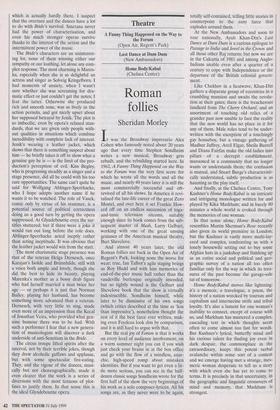Theatre
A Funny Thing Happened on the Way to the Forum (Open Air, Regent's Park) Last Dance at Dum Dum (New Ambassadors) Home Body/Kabul (Chelsea Centre)
Roman follies
Sheridan Morley
It was the Broadway impresario Alex Cohen who famously noted about 20 years ago that every time Stephen Sondheim writes a new musical, Broadway gets rebuilt, and the rebuilding started here. In 1962, A Funny Thing Happened on the Way to the Forum was the very first score for which he wrote all the words and all the music, and nearly 40 years later it is still the most commercially successful and oft- revived of all his shows. In America it revi- talised the late-life career of the great Zero Mostel, and over here it set Frankie How- erd off on an endless succession of toga- and-tunic television sitcoms, suitably enough since its book comes from the sub- sequent master of Mash, Larry Gelbart, working with one of the great unsung geniuses of the American musical theatre, Burt Shevelove.
And almost 40 years later, the old Roman follies are back in the Open Air of Regent's Park, looking none the worse for wear; true, Ian Talbot's agile staging brings us Roy Hudd and with him memories of end-of-the-pier music hall rather than the vaudeville burlesque originally intended, but so tightly wound is the Gelbart and Shevelove book that the show is virtually indestructible. Sondheim himself, while later to be dismissive of his own songs (which critics described at the time as 'less than impressive'), nonetheless thought the rest of it the best farce ever written, mak- ing even Feydeau look dim by comparison, and it is still hard to argue with that.
But the real joy of Forum is that it works on every level of audience involvement; on a warm summer night you can if you wish just check your brains in at the box office and go with the flow of a mindless, anar- chic, high-speed romp about mistaken identities. But if you want to get even a lit- tle more serious, you can see in the half- dozen classic songs Sondheim wrote for the first half of the show the very beginnings of his work as a solo composer-lyricist. All his songs are, as they never were to be again, totally self-contained, telling little stories in counterpoint to the zany farce that explodes around them.
At the New Ambassadors and soon to tour nationally, Ayub Khan-Din's Last Dance at Dum Dum is a curious epilogue to Passage to India and Jewel in the Crown and all those other Raj returns; but now we are in the Calcutta of 1981 and among Anglo- Indians unable even after a quarter of a century to cope with Independence or the departure of the British colonial govern- ment.
Like Chekhov in a heatwave, Khan-Din gathers a disparate group of eccentrics in a crumbling mansion and awaits the revolu- tion at their gates; there is the treacherous landlord from The Cherry Orchard, and an assortment of touching old relics of a grander past now unable to face the reality that the new world has no place in it for any of them. Male roles tend to be under- written with the exception of a touchingly gay houseboy, but a vintage gathering of Madhur Jaffrey, Avril Elgar, Sheila Burrell and Diana Fairfax make the old ladies into pillars of a decrepit establishment, marooned in a community that no longer wants or understands them; the confusion is mutual, and Stuart Burge's characteristi- cally understated, subtle production is as haunting as the play itself.
And finally, at the Chelsea Centre, Tony Kushner's Home BodylKabul is an intricate and intriguing monologue written for and played by Kika Markham; and in barely 80 minutes a whole world is evoked through the memories of one woman.
In that sense alone, Home BodylKabul resembles Martin Sherman's Rose recently also given its world premiere in London; but the Kushner is vastly more multi-lay- ered and complex, confronting us with a lonely housewife setting out to buy some Afghan hats in a junkshop and finishing up as an entire social and political and geo- graphic survey of a nation all too often familiar only for the way in which its trea- sures of the past become the garage-sale tat of tomorrow.
Home Body/Kabul moves like lightning; it's a memoir, a travelogue, a poem, the history of a nation wrecked by tourism and capitalism and internecine strife and tribal loyalty. It's also a lament for one woman's inability to connect, except of course with us, and Markham has mastered a complex, cascading text in which thoughts seem often to come almost too fast for words. But Kushner's lyrical, butterfly mind and his curious talent for finding joy even in dark despair, the commonplace in the extraordinary, keeps this potent verbal avalanche within some sort of a context and we emerge having met a strange, mes- meric woman desperate to tell us a story with which even she has yet to come to terms. It is precisely in that uncertainty, in the geographic and linguistic crossovers of mind and memory, that Markham is strongest.


























































 Previous page
Previous page